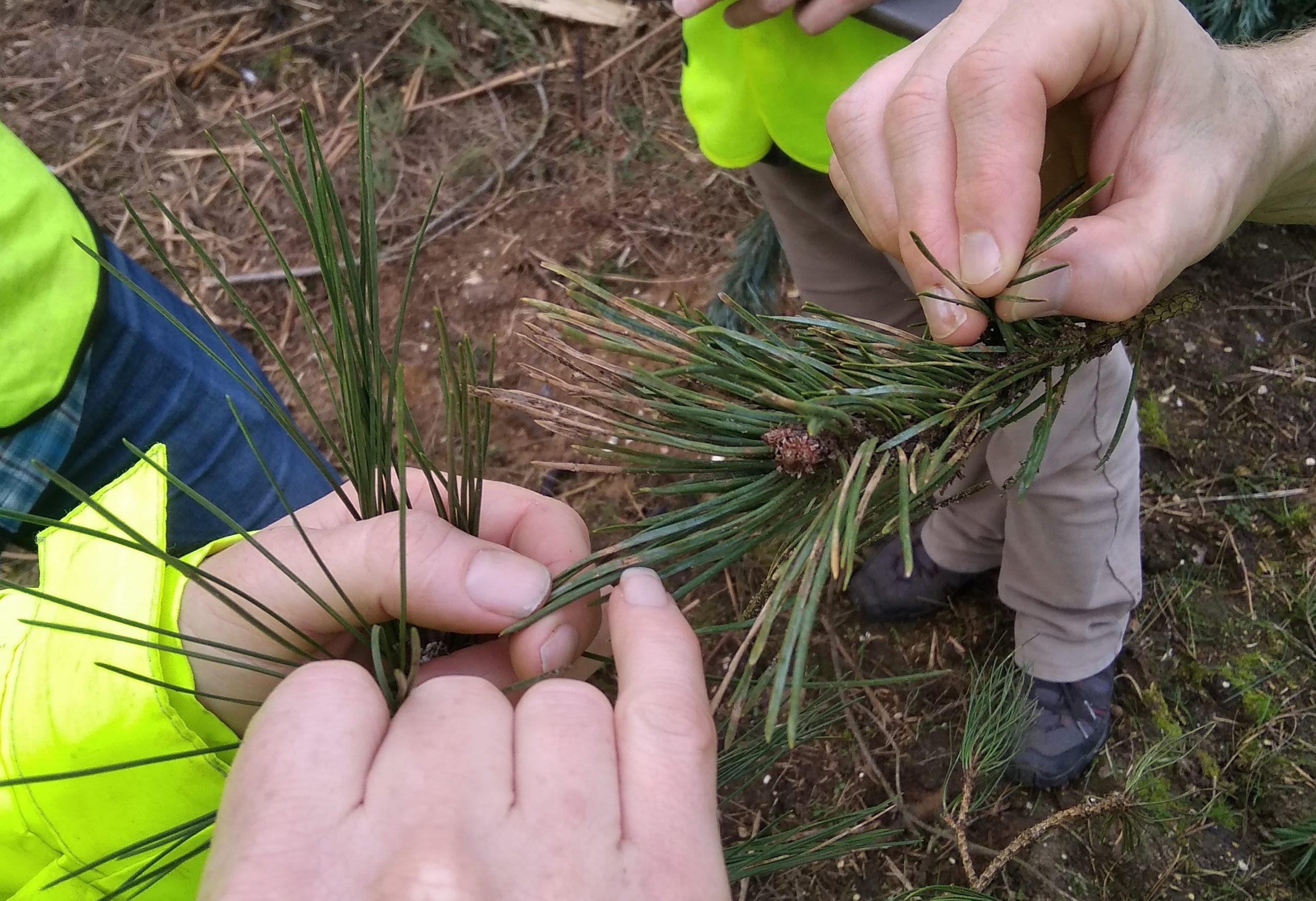Summary
This project aims to develop a more cohesive and comprehensive understanding of the concept of resilience and demonstrate how it can be used to support decision-making and management for plant and tree health. It comes under Work Package six of the Defra-funded Future Proofing Plant Health project which represents a co-ordinated response to growing concerns over plant and tree health.
Resilience – Research Objectives and Findings

This page summarises some key findings and outputs from the Resilience Work Package (WP6) of the Future Proofing Plant Health project.
Phase 1 (2014 – 2015)
Objective: Collate the definitions and uses of the concept of resilience and develop a decision-making framework.
Our findings (see Fuller & Quine 2016) show that although resilience is rapidly becoming a prominent concept in research, policy and practice, there is no consistent meaning of resilience being used by those involved in governing and managing forests and tree health. Our research suggests that due to the complexity of the resilience concept and forest systems, no single definition of resilience can be sufficient, and it is more appropriate to explicitly consider four resilience components: resistance, recovery, transformation and adaptation. Based on these findings, we developed a Resilience Implementation Framework containing a set of six decision steps to guide management for resilience (see below for follow-up case studies). The work was subsequently adapted for inclusion in Defra’s Tree Health Resilience Strategy.
Objective: Explore the demand and feasibility of a woodland classification system to describe resilience.
A short scoping exercise revealed that although potentially appealing to some stakeholders, significant obstacles exist to the development and use of such a classification system. These include:
- Differing interpretations of resilience amongst stakeholders
- Increasing resilience in one aspect of woodlands might reduce resilience in another
- Uncertainty on the strength and consistency of the link between woodland characteristics and resilience
- Limited availability of data on the characteristics needed to assign woodlands to classes
Phase 2 (2015 – 2020)
Objective: Investigate options and considerations for using resistant trees as a strategy for mitigating impacts from pests and pathogens.
Our investigation into the use of resistant trees identified six general steps in the process, from the scoping and search for resistant material through to field monitoring. This work also discusses the options for each stage, as well as the risks and considerations involved when using resistant trees (see Woodcock et al. 2018). Informed by this framework, we then focused on options for mitigating impacts from ash dieback (see Woodcock et al. in press), which synthesises information on:
- The frequency and heritability of ash dieback resistance across Europe (Coker et al. 2019)
- Perspectives of forest managers on options for responding to the disease (Marzano et al. 2019)
- Exploration of the approaches to developing and using resistant trees in other countries (Woodcock et al. 2019)
Objectives: Provide evidence to help better understand the effect of environmental, ecological, and geographic factors on tree health, particularly in the context of tree pests and pathogens.
- This research includes an ongoing analysis of a large-scale long-term dataset – the Forest Condition Survey. One way the survey data was used was to produce metrics of resistance and recovery from data on insect damage and crown density.
- Systematic mapping (a form of evidence synthesis) is also ongoing to collate the evidence for factors affecting resilience against tree pests and pathogens. The peer-reviewed methods for the systematic mapping can be accessed here.
Objective: Pilot tools to assess the risks to trees, woodlands and the associated ecosystem services at a range of scales.
We explored the tools already available that could help practitioners and policymakers incorporate resilience and related concepts into forestry and then evaluated the strengths and weaknesses of the tools in relation to end user needs.
The general findings include:
- An over-arching single resilience tool does not exist. Benefits of and barriers to the development of such a tool were identified and discussed.
- The best practical tools currently available for decision makers and forestry practitioners in the UK are those developed by Forest Research.
- In addition, there are connectivity tools directly applicable for research uses, and forestry tools developed in North America directly applicable to UK forests on the condition of input of suitable UK datasets.
- Many of the tools that were identified would require further development to adapt them to resilience applications.
Objective: Test the Resilience Implementation Framework in practice through case studies in England
In line with the aims of the Tree Health Resilience Strategy, we tested the Resilience Implementation Framework (see Fuller and Quine 2016) through workshops in collaboration with the National Forest Company, The Woodland Trust (Fingle Woods) and Forestry England (Thetford Forest), with further case studies being planned for 2019/20. We are also contributing to pilot trials by Scottish Natural Heritage of a modified framework for use in Natura 2000 sites. General findings so far include:
- Participants have found the Framework useful, especially in clarifying the resilience concept.
- Clear definitions of the focal system and management objectives are crucial to produce coherent resilience actions.
- Resilience actions identified during the workshops had all been previously considered by participants. However, some commented that the Framework provided a useful way to structure these actions in the context of resilience planning.
- Some participants are thinking about resilience in a broad sense, encompassing topics such as climate change and deer management – not just regarding tree health and species diversification. This may influence how the goals of the Tree Health Resilience Strategy are addressed, and how easily managers will find a focus on pests and diseases alone.
Resilience – Research Partners
On this page you can see the Forest Research staff involved in this project and our partners at The Department for Environment, Food and Rural Affairs (Defra), the Joint Nature Conservation Committee (JNCC) and the Royal Botanic Gardens, Kew

Forest Research
JNCC
Charlotte Amos
Kirsi Peck
Paul Woodcock
RBG Kew
Resilience – Publications
This page lists the peer-reviewed publications, as well as manuscripts in review and preparation, produced through the Resilience Work Package included in the Defra-funded Future Proofing Plant Health project.
Publications
Wright, E, Woodcock, P, Newton, N, Petr, M, Watts, K, Forster, J, Bellamy, C & Quine, C P. In preparation. Effect of forest and landscape characteristics on tree health and resilience.
Plumb, W J, Coker, T L R, Stocks, J J, Woodcock, P, Quine C P, Nemesio-Gorriz, M, Douglas, G C, Kelly, L J & Buggs, R J A. (2019). The viability of a breeding programme for ash in the British Isles in the face of ash dieback. Plants, People, Planet.
Woodcock, P, Buggs, R J A, Marzano, M & Quine, C P. In press. Exploring strategies for responding to Ash Dieback in the UK. Quarterly Journal of Forestry.
Coker, T L R, Rozsypálek, J, Edwards, A, Harwood, T P, Butfoy, L A & Buggs, R J A (2019). Estimating mortality rates of European ash (Fraxinus excelsior) under the ash dieback (Hymenoscyphus fraxineus) epidemic. Plants, People, Planet 1 48-58.
Marzano, M, Woodcock, P & Quine, C P (2019). In review. Dealing with dieback: Forest manager attitudes towards developing resistant ash trees in the United Kingdom. Forestry.
Woodcock, P, Marzano, M & Quine, C P (2019). Key lessons from resistant tree breeding programmes in the Northern Hemisphere. Annals of Forest Science 76:51.
Rafiqi, M, Saunders, D, McMullan, M, Oliver, R, Bone, R, Fones, H, Gurr, S, Vincent, D, Coker, T & Buggs, R J A (2018). Plant-killers: Fungal threats to ecosystems. In: K J Willis (ed.), State of the World’s Fungi. Report. Royal Botanic Gardens, Kew. pp. 56–61.
Woodcock, P, Cottrell, J, Buggs, R J A & Quine, C P (2018). Mitigating pest and pathogen impacts using resistant trees: a framework and overview to inform development and deployment in Europe and North America. Forestry 91 1-16.
Young, J, Marzano, M, Quine, C P & Ambrose-Oji, B (2018). Working with decision-makers for resilient forests: a case study from the UK. Forest Ecology and Management 417 291-300.
Fuller, L & Quine, C P (2016). Resilience and tree health: a basis for implementation in sustainable forest management. Forestry 89 7-19.
Research Objectives
The information below provides a summary of the objectives across the two phases of the project. More information on the objectives and the related findings and outputs from the Resilience Work Package can be found here.

Phase 1 (2014-2015)
- Collate the definitions and uses of the concept of resilience and develop a decision-making framework.
- Explore the demand and feasibility of a woodland classification system to describe resilience.
Phase 2 (2015-2020)
- Investigate options and considerations for using resistant trees as a strategy for mitigating impacts from pests and pathogens.
- Provide evidence to help better understand the effect of environmental, ecological, and geographic factors on tree health, particularly in the context of tree pests and pathogens.
- Pilot tools to assess the risk to trees, woodlands and the associated ecosystem services at a range of scales.
- Test the Resilience Implementation Framework in practice through case studies in England.
Findings
A summary of some of the key findings and outputs from the Resilience Work Package can be found here.
Latest Update
Phase 1 lasted from November 2014 to March 2015 and laid the foundation for Phase 2. Phase 2 commenced in April 2015 and will last until 2020; activities will complement those research challenges funded by the Forestry Commission.
Our Involvement
Forest Research led the management and delivery of the Resilience Work Package (WP6) of Future Proofing Plant Health. The level of direct involvement of Forest Research and the research partners Joint Nature Conservation Committee (JNCC) and Royal Botanic Gardens Kew varies across the different outputs.
Funding & Partners
-
 The Department for Environment, Food and Rural Affairs (Defra)
The Department for Environment, Food and Rural Affairs (Defra) -
 The Joint Nature Conservation Committe (JNCC)
The Joint Nature Conservation Committe (JNCC) -
 Royal Botanic Gardens Kew
Royal Botanic Gardens Kew
